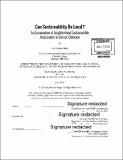Can sustainability be local? : an examination of neighborhood sustainability assessment in Denver, Colorado
Author(s)
Perkins-High, Lily
DownloadFull printable version (9.758Mb)
Alternative title
Examination of neighborhood sustainability assessment in Denver, Colorado
Other Contributors
Massachusetts Institute of Technology. Department of Urban Studies and Planning.
Advisor
Brent D. Ryan.
Terms of use
Metadata
Show full item recordAbstract
While the challenge of achieving a sustainable built environment is global, governments and nonprofits working to advance sustainability are increasingly turning to the neighborhood scale (Luederitz, Lang, and von Wehrden 2013). This attention to the neighborhood has been accompanied by a corresponding increase in Neighborhood Sustainability Assessment (NSA) standards, which evaluate neighborhoods against sustainability criteria. Since 2001, when the first NSA standard was published (Sharifi 2016), the number of NSA standards in use worldwide has climbed to 32 (Criterion Planners 2016). Despite this volume, there is relatively little written on individual NSA standards, and even less on how these standards compare to one another or relate to city-led sustainability efforts (Haapio 2012; Sharifi and Murayama 2013; Berardi 2013; Reith and Orova 2015; Komeily and Srinivasan 2015). This study addresses these gaps in the literature by studying four NSA standards in use in Denver, Colorado: LEED ND, 2030 Districts, EcoDistricts, and Sustainable Neighborhoods. This is the first study to examine the use of multiple NSA standards in the same city and the first to analyze the relationship between NSA standards and citywide sustainability efforts. I answer the following three questions: What are the similarities and differences between the intent, certification approach, and applicability of different NSA standards? Why are individuals, institutions, and cities adopting NSA standards and how satisfied are they with their choice? What is the relationship between NSA standards and city-led, city-scale planning? I find that the four NSA standards I examine prioritize different elements of sustainability, employ different approaches to certification, and operate in different development contexts, and that this diversity helps advance neighborhood-scale sustainability in Denver. I find that individuals adopt specific NSA standards as a result of a tangle of iterative decisions that draw upon the initiator's personal and professional networks, their knowledge of the variety of standards available, and the authority they possess. Finally, I find that these four NSA projects are well connected to the City of Denver but that rather than working through Denver's Office of Sustainability, they intersect with multiple City agencies, thus benefiting from Denver's mandate that all City departments support sustainability initiatives.
Description
Thesis: M.C.P., Massachusetts Institute of Technology, Department of Urban Studies and Planning, 2016. Cataloged from PDF version of thesis. Includes bibliographical references (pages 80-83).
Date issued
2016Department
Massachusetts Institute of Technology. Department of Urban Studies and PlanningPublisher
Massachusetts Institute of Technology
Keywords
Urban Studies and Planning.